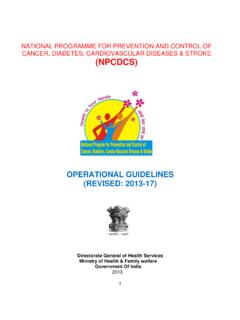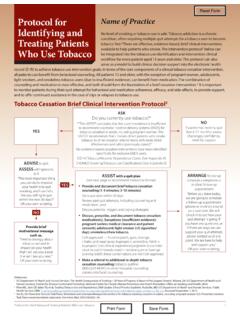Transcription of Chapter 2: Building Health Skills and Character
1 Building Health Skills and Character Building Health Skills Making Responsible Decisions and Setting Goals Building Character 26. Do You Practice Effective Health Skills ? Respond by writing yes, no, or sometimes for each item. Write yes only for items that you practice regularly or are sure about. 1. I know how to access reliable Health information and services. 2. I care about the well-being of others and encourage them to make healthy choices. 3. I am aware of what influences my actions and decisions. 4. I communicate my thoughts and feelings clearly. 5. I am comfortable saying no to friends and peers who want to engage in risky or unhealthy activities. 6. I use problem-solving Skills to resolve conflicts in a peaceful, respectful manner. 7. I engage in regular physical activity and eat nutritious foods. 8. I am aware of sources of stress in my life and know how to reduce or manage them. 9. When making decisions, I consider how the consequences might affect my Health and the Health of others.
2 10. I set personal Health goals. Using Visuals. List Skills that you think would help teens lead healthy lives. What Skills are the teens in this photo demonstrating? Which Skills For instant feedback on your Health do you practice on a regular basis to maintain or status, go to Chapter 2 Health improve your Health ? Inventory at 27. Building Health Skills VOCABULARY YOU'LL LEARN TO. Health Skills Demonstrate communication Skills in Building and maintaining interpersonal healthy relationships. communication Develop refusal strategies and conflict resolution Skills . refusal Skills conflict resolution Apply self-management strategies. stress management Analyze influences on behavior. advocacy Develop criteria for evaluating Health information. On a sheet of paper, list the Skills and qualities necessary for effective communication. Then, explain how having strong communication Skills can impact your Health in positive ways. T HE H EALTH. S KILLS. Developing and practicing these Health Skills will T he choices you make and the actions you take including the foods you eat, the friends you choose, and the activities you participate in can affect your Health .
3 Taking responsibility for your provide a lifetime of benefits. Health begins with a commitment to take charge of your actions Interpersonal and behaviors in a way that reduces risks and promotes wellness. Communication The first step is to develop Health Skills . Health Skills , or life Skills , Communication Skills are specific tools and strategies that help you maintain, protect, and Refusal Skills improve all aspects of your Health . Figure presents a basic Conflict Resolution overview of the Health Skills . Self Management Practicing Healthful Behaviors Interpersonal Skills Stress Management Analyzing Influences O ne of the traits of a Health -literate individual is having effective communication Skills . Effective communication involves not only making yourself heard but also being a good listener. Accessing Information Interpersonal communication is the exchange of thoughts, feel- Decision Making/Goal ings, and beliefs between two or more people. Setting Advocacy 28 Chapter 2 Building Health Skills and Character Strategies for effective communication include: Clearly say what you mean.
4 Use I messages to state your position, for example, I feel frustrated when our plans change. communication For more This helps you avoid placing blame on others. information on communication Skills , see Chapter 10, page 254. Pay attention to how you say something. Use a respectful tone. Make sure your facial expressions and gestures reflect your verbal message. Be a good listener. Avoid interrupting the speaker, and show that you are listening by nodding or asking appropriate questions. Communication: The Ball's in Your Court When Mark arrives late at the basketball court, his friend Phillipe throws the ball at him, shouting, You're a half hour late! . What Would You Do? Well, excuse me, Mr. Punctual, Mark laughs. How can Mark and Phillipe use You're never on time. It's like you assume I have effective communication Skills to nothing better to do than wait around for you, continue their discussion more effectively? Write an ending to Phillipe says. this scenario, using the guidelines Sorry, bud, but some things came up, Mark answers.
5 Below. Yeah? Well, I'm outta here. Phillipe throws up his 1. Use I messages. hands and turns to walk away. 2. Speak calmly and clearly, using a respectful tone. Wait, let me explain, Mark says calmly. 3. Listen carefully, and ask Phillipe hesitates, wondering how to respond. appropriate questions. 4. Show appropriate body language. Lesson 1 Building Health Skills 29. R EFUSAL S TRATEGIES. Sometimes you must reinforce your decision to say no. SAY NO IN A FIRM VOICE. Do this calmly and clearly. Use expressions such as I'd rather not.. EXPLAIN WHY. State your feelings. Tell the other person that the suggested activity or behavior goes against your values or beliefs. SUGGEST ALTERNATIVES. Propose a safe, healthful activity to do instead. USE APPROPRIATE BODY LANGUAGE. Make it clear that you don't intend to back down from your position. Look directly into the other person's eyes. LEAVE IF NECESSARY. If the other person continues to pressure you, or simply won't take no for an answer, just walk away.
6 Refusal Skills Think about how you handle situations in which you are asked to do something that you know is harmful or wrong. In such Respect. When you apply refusal circumstances, you need to use refusal Skills . Refusal Skills Skills to avoid risky situations, you are communication strategies that can help you say no when you are demonstrate respect for yourself urged to take part in behaviors that are unsafe or unhealthful, or that go and your values. How can using against your values. Practicing these strategies, including the ones refusal Skills help you uphold shown in Figure , will help you resist risky behaviors. your values and the values of your family? Conflict Resolution Skills In addition to practicing effective refusal Skills , it is important to develop strategies for dealing with conflicts or disagreements. Conflict resolution is the process of ending a conflict through coop- eration and problem solving. The key to conflict resolution is respecting the other person's rights as well as your own.
7 Willingness to compromise will also help achieve a resolution that satisfies everyone. Follow these steps when dealing with a conflict: Take time to calm down and think through the situation. When discussing the conflict, speak calmly and listen attentively, asking questions when appropriate. Use a polite tone and try to brainstorm solutions where no one loses respect. Work to resolve the conflict peacefully. 30 Chapter 2 Building Health Skills and Character Self-Management Skills W hen you practice self management, you take responsibility for your Health and act in specific ways that promote your wellness. Two self- management Skills , practicing healthful behaviors and managing stress, help provide a foundation of good Health . Practicing Healthful Behaviors Choices you make today will affect your Health in the future. Healthful behaviors are more than just actions that can protect you from illness or injury. These behaviors support every aspect of your Health . Eating nutritious foods and getting regular medical and dental checkups as well as avoiding the use of tobacco, alcohol, and other drugs, are all behaviors that help you maintain and strengthen your overall Health .
8 Practicing healthful behaviors also involves expressing your feelings in healthful ways, Building your self-esteem, and maintaining Practicing healthful healthy relationships. behaviors includes making everyday activities safe for you and those around Managing Stress you. What healthful Stress, the body's and mind's reactions to everyday demands, is behaviors do you practice a natural part of life. Being late to class, balancing many activities, on a regular basis? and winning an award can all cause stress. Learning stress man- agement, or ways to deal with or overcome the negative effects of stress, will become increasingly important as you assume more responsibility for your Health and take on additional roles as an adult. Some strategies for managing stress include engaging in physical activity, listening to soothing music, managing time effectively, taking a warm bath, and laughing. Analyzing Influences H ow do you determine what Health choices are right for you? Many factors influence your Health .
9 Internal influences, which include your knowledge, values, likes, dislikes, and desires, are based on your experiences and your perspective on life. You have a great deal of control over your internal influences. External influences, which come from outside sources, include your family, your friends and peers, your environment, your culture, laws, and the media. As you become aware of these influences, you will be better able to make healthful choices about everything from your personal behavior to which Health products you buy. Lesson 1 Building Health Skills 31. Talking to a Health Accessing Information professional can help you obtain accurate, reliable information. Where else L earning how to find and recognize trustworthy information will help you be better prepared to make healthful choices. When evaluating Health information, check the validity of the can you find valid Health information? source. Keep in mind that reliable sources of Health information include: parents, guardians, and other trusted adults.
10 Library resources, such as encyclopedias and nonfiction books on science, medicine, nutrition, and fitness. reliable Internet sites, such as those posted by government and educational institutions. newspaper and magazine articles by Health professionals or experts. government agencies, Health care providers, and Health organizations. Advocacy A dvocacy is taking action to influence others to address a Health -related concern or to support a Health -related belief. This skill enables you to positively influence the Health of those around you. In this responsible role, you can help others become informed and publicly support Health causes that concern and interest you. Encouraging family, friends, peers, and community members to practice healthful behaviors is one way to practice Health advocacy. Reviewing Facts and Vocabulary Applying Health Skills 1. Define the term interpersonal communication, and Stress Management. List all the healthful identify the role of I messages. strategies you used this past week to relieve 2.

